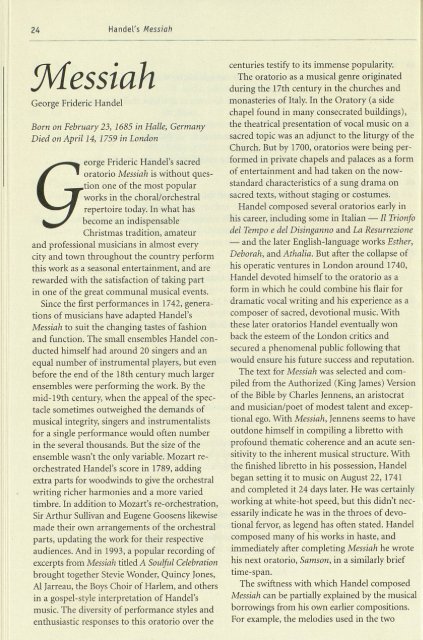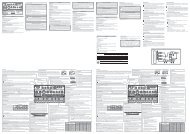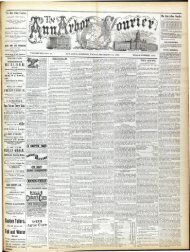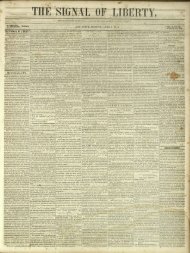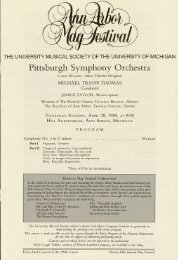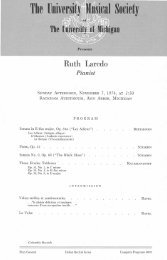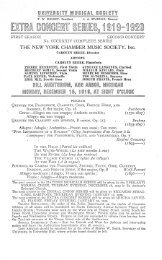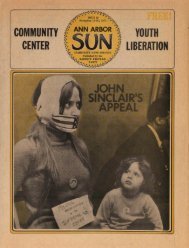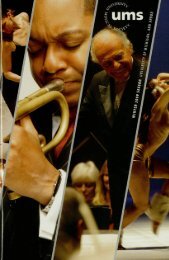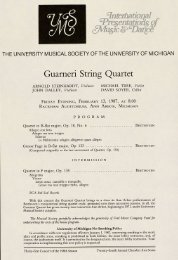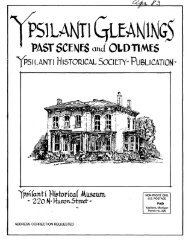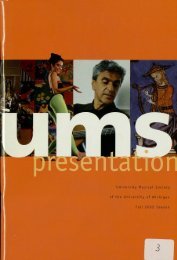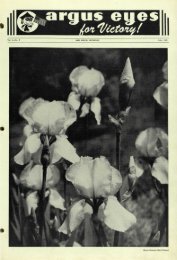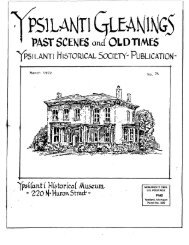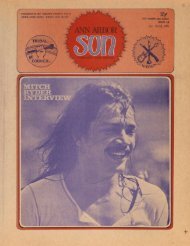university musical society - Ann Arbor District Library
university musical society - Ann Arbor District Library
university musical society - Ann Arbor District Library
You also want an ePaper? Increase the reach of your titles
YUMPU automatically turns print PDFs into web optimized ePapers that Google loves.
24<br />
Handel's Messiah<br />
^Messiah<br />
George Frideric Handel<br />
Born on February 23, 1685 in Halle, Germany<br />
Died on April 14, 1759 in London<br />
^ ^ eorge Frideric Handel's sacred<br />
J • oratorio Messiah is without ques-<br />
• _^^tion one of the most popular<br />
^^ W works in the choral/orchestral<br />
^^*/ repertoire today. In what has<br />
^^^f become an indispensable<br />
Christmas tradition, amateur<br />
and professional musicians in almost every<br />
city and town throughout the country perform<br />
this work as a seasonal entertainment, and are<br />
rewarded with the satisfaction of taking part<br />
in one of the great communal <strong>musical</strong> events.<br />
Since the first performances in 1742, genera<br />
tions of musicians have adapted Handel's<br />
Messiah to suit the changing tastes of fashion<br />
and function. The small ensembles Handel con<br />
ducted himself had around 20 singers and an<br />
equal number of instrumental players, but even<br />
before the end of the 18th century much larger<br />
ensembles were performing the work. By the<br />
mid-19th century, when the appeal of the spec<br />
tacle sometimes outweighed the demands of<br />
<strong>musical</strong> integrity, singers and instrumentalists<br />
for a single performance would often number<br />
in the several thousands. But the size of the<br />
ensemble wasn't the only variable. Mozart re-<br />
orchestrated Handel's score in 1789, adding<br />
extra parts for woodwinds to give the orchestral<br />
writing richer harmonies and a more varied<br />
timbre. In addition to Mozart's re-orchestration,<br />
Sir Arthur Sullivan and Eugene Goosens likewise<br />
made their own arrangements of the orchestral<br />
parts, updating the work for their respective<br />
audiences. And in 1993, a popular recording of<br />
excerpts from Messiah titled A Soulful Celebration<br />
brought together Stevie Wonder, Quincy Jones,<br />
Al Jarreau, the Boys Choir of Harlem, and others<br />
in a gospel-style interpretation of Handel's<br />
music. The diversity of performance styles and<br />
enthusiastic responses to this oratorio over the<br />
centuries testify to its immense popularity.<br />
The oratorio as a <strong>musical</strong> genre originated<br />
during the 17th century in the churches and<br />
monasteries of Italy. In the Oratory (a side<br />
chapel found in many consecrated buildings),<br />
the theatrical presentation of vocal music on a<br />
sacred topic was an adjunct to the liturgy of the<br />
Church. But by 1700, oratorios were being per<br />
formed in private chapels and palaces as a form<br />
of entertainment and had taken on the now-<br />
standard characteristics of a sung drama on<br />
sacred texts, without staging or costumes.<br />
Handel composed several oratorios early in<br />
his career, including some in Italian — // Trionfo<br />
del Tempo e del Disinganno and La Resurrezione<br />
and the later English-language works Esther,<br />
Deborah, and Athalia. But after the collapse of<br />
his operatic ventures in London around 1740,<br />
Handel devoted himself to the oratorio as a<br />
form in which he could combine his flair for<br />
dramatic vocal writing and his experience as a<br />
composer of sacred, devotional music. With<br />
these later oratorios Handel eventually won<br />
back the esteem of the London critics and<br />
secured a phenomenal public following that<br />
would ensure his future success and reputation.<br />
The text for Messiah was selected and com<br />
piled from the Authorized (King James) Version<br />
of the Bible by Charles Jennens, an aristocrat<br />
and musician/poet of modest talent and excep<br />
tional ego. With Messiah, Jennens seems to have<br />
outdone himself in compiling a libretto with<br />
profound thematic coherence and an acute sen<br />
sitivity to the inherent <strong>musical</strong> structure. With<br />
the finished libretto in his possession, Handel<br />
began setting it to music on August 22, 1741<br />
and completed it 24 days later. He was certainly<br />
working at white-hot speed, but this didn't nec<br />
essarily indicate he was in the throes of devo<br />
tional fervor, as legend has often stated. Handel<br />
composed many of his works in haste, and<br />
immediately after completing Messiah he wrote<br />
his next oratorio, Samson, in a similarly brief<br />
time-span.<br />
The swiftness with which Handel composed<br />
Messiah can be partially explained by the <strong>musical</strong><br />
borrowings from his own earlier compositions.<br />
For example, the melodies used in the two


